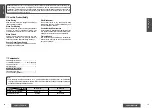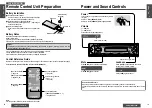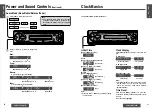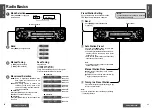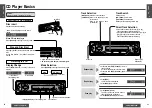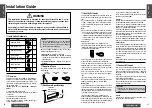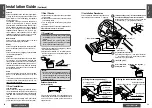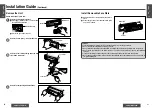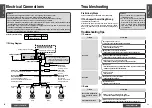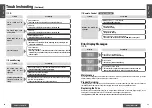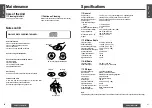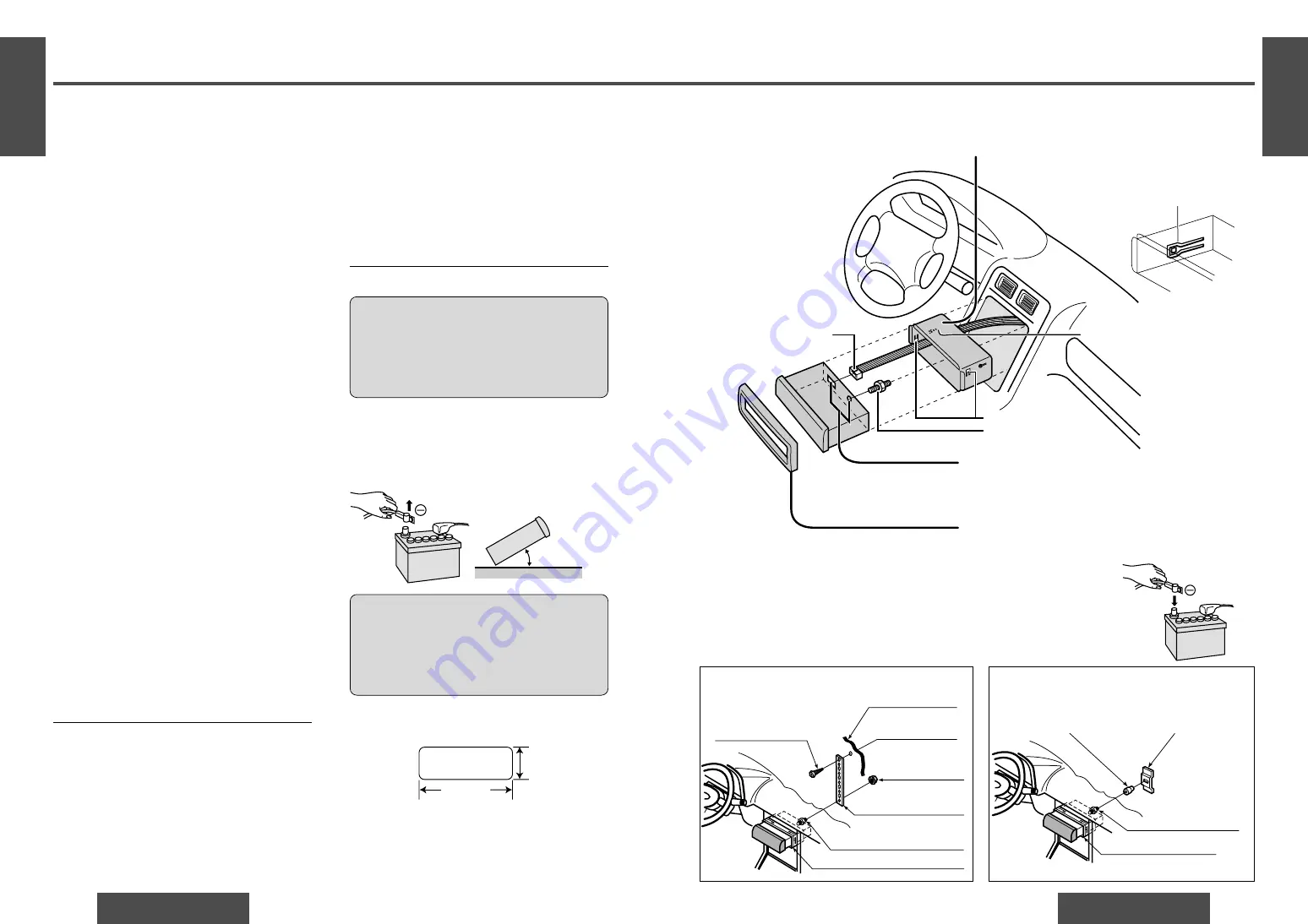
E
N
G
L
I
S
H
12
CQ-DP151/DP101W
29
E
N
G
L
I
S
H
11
CQ-DP151/DP101W
28
Installation Guide
(Continued)
Speakers
Connect the speaker wires. See the wiring diagram
(
➡
page 32) for the proper hookups. Follow the di-
agram carefully to avoid damaging the speakers
and the stereo unit.
The speakers used must be able to handle more
than 45 W of audio power. If using an optional
audio amplifier, the speakers should be able to han-
dle the maximum amplifier output power. Speakers
with low input ratings can be damaged. Speaker
impedance should measure 4–8
≠
, which is typi-
cally marked on most speakers. Lower or higher
impedance speakers will affect output and can
cause both speaker and stereo unit damage.
Motor Antenna
Connect the car motor antenna lead to the dark
blue motor antenna relay control lead.
Battery
Connect the yellow battery lead to the correct radio
wire or to the battery fuse port on the fuse block.
Antenna
Connect the antenna by plugging the antenna lead
into the antenna receptacle.
Equipment
Connect any optional equipment such as an ampli-
fier, according to the instructions furnished with
the equipment. Leave about 30 cm of distance be-
tween the speaker leads/amplifier unit and the an-
tenna/antenna extension cord. Read the operating
and installation instructions of any equipment you
will connect to this unit.
Power
Connect the red power lead to the correct car radio
wire or to the appropriate fuse port on the fuse
block.
If the stereo unit functions properly with all these
connections made, disconnect the wires and pro-
ceed to the final installation.
❐
Final Checks
1. Make sure that all wires are properly connected
and insulated.
2. Make sure that the stereo unit is securely held in
the mounting collar.
3. Turn on the ignition to check the unit for proper
operation.
If you have difficulties, consult your nearest author-
ized professional installer for assistance.
❐
Preparation
≥
We strongly recommend that you wear gloves
for installation work to protect yourself from
injuries.
≥
When bending the mounting tabs of the
mounting collar with a screwdriver, be careful
not to injure your hands and fingers.
≥
Disconnect the cable from the negative
-
battery
terminal (see caution below).
≥
Unit should be installed in a horizontal position
with the front end up at a convenient angle, but
not more than 30
o
.
Caution:
≥
Do not disconnect the battery terminals of a
car with a trip or navigational computer since
all user settings stored in memory will be lost.
Instead take extra care with installing the unit
to prevent shorts.
Less than 30
x
First complete the electrical connections, and
then check them for correctness. (
➡
page 32)
6
Power connector
Lock lever (
§
)
Mounting tabs
5
Mounting bolt
❐
Installation Procedures
Insert mounting collar
1
into the dashboard, and
bend the mounting tabs out with a screwdriver.
Make sure that the lock lever (
§
) is flush with the
mounting collar
1
(not projecting outward).
(a) Using the rear support strap
3
4
Tapping screw
(5 mm
·a
16 mm)
2
Hex. nut
(5 mm
·
)
3
Rear support
strap
5
Mounting bolt
(5 mm
·
)
1
Mounting collar
Fire wall of car
3 mm
·
(b) Using the rubber cushion (option)
5
Mounting bolt
(5 mm
·
)
1
Mounting collar
Rear support bracket
(provided on the car)
Rubber cushion (option)
Lock lever (
§
)
❐
Final Installation
Lead Connections
Connect all wires, making sure that each connec-
tion is insulated and secure. Bundle all loose wires
and fasten them with tape so they will not fall down
later. Now insert the stereo unit into the mounting
collar.
Congratulations! After making a few final checks,
you’re ready to enjoy your new auto stereo system.
Dashboard Installation
Installation Opening
182 mm
53 mm
1
Secure the rear of the unit.
After fixing mounting bolt
5
and power connector
6
, fix the rear of the unit to the car body by either
method (a) or (b) shown below.
Insert trim plate
7
.
After installation, reconnect the negative
-
battery terminal.
2
3
4
This unit can be installed in any dashboard having
an opening as shown above. The dashboard should
be 4.75 mm
j
5.56 mm thick in order to be able to
support the unit.


